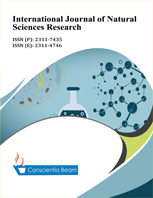Effects of Aqueous Extract of Yerba Mate (Ilex Paraguariensis) on the Oxidative Stress in Rats Fed a Cafeteria Diet
Abstract
Ilex paraguariensis A. St.- Hil., Aquifoliaceae, is a native species of subtropical and temperate regions of South America, whose leaves and steams are used to make tea and traditional infusions, such as chimarrão and tereré. These beverages are considered beneficial to health because of their physiological effects on the treatment of rheumatism, obesity, fatigue, fluid retention, hypertension and liver disorders. This study examined the effects of aqueous extract of I. paraguariensis leaves on the oxidative stress of rats fed a cafeteria diet. A total of 40 male Wistar rats were equally divided into four groups and fed distinct diets for 15 days: group C (rat chow and water), group E (rat chow and aqueous extract of I. paraguariensis), group CD (cafeteria diet and water) and group ED (cafeteria diet and aqueous extract of I. paraguariensis). Lipid peroxidation (TBARS), reduced glutathione (GSH) and catalase activity (CAT) were subsequently assessed. Brain and liver histological analyses were also carried out. The results showed that aqueous extract of I. paraguariensis was able to reverse the oxidative stress caused by the cafeteria diet on serum, as well as significantly reduce lipid peroxidation in liver and brain tissues. A significant increase in GSH levels in the brain of animals fed the cafeteria diet was observed. However, this effect was only observed in the liver of animals fed with rat chow. Therefore, the aqueous extract of I. paraguariensis has important effects on the modulation of antioxidant defenses and oxidative stress, possibly being beneficial to health after eating the cafeteria diet.

